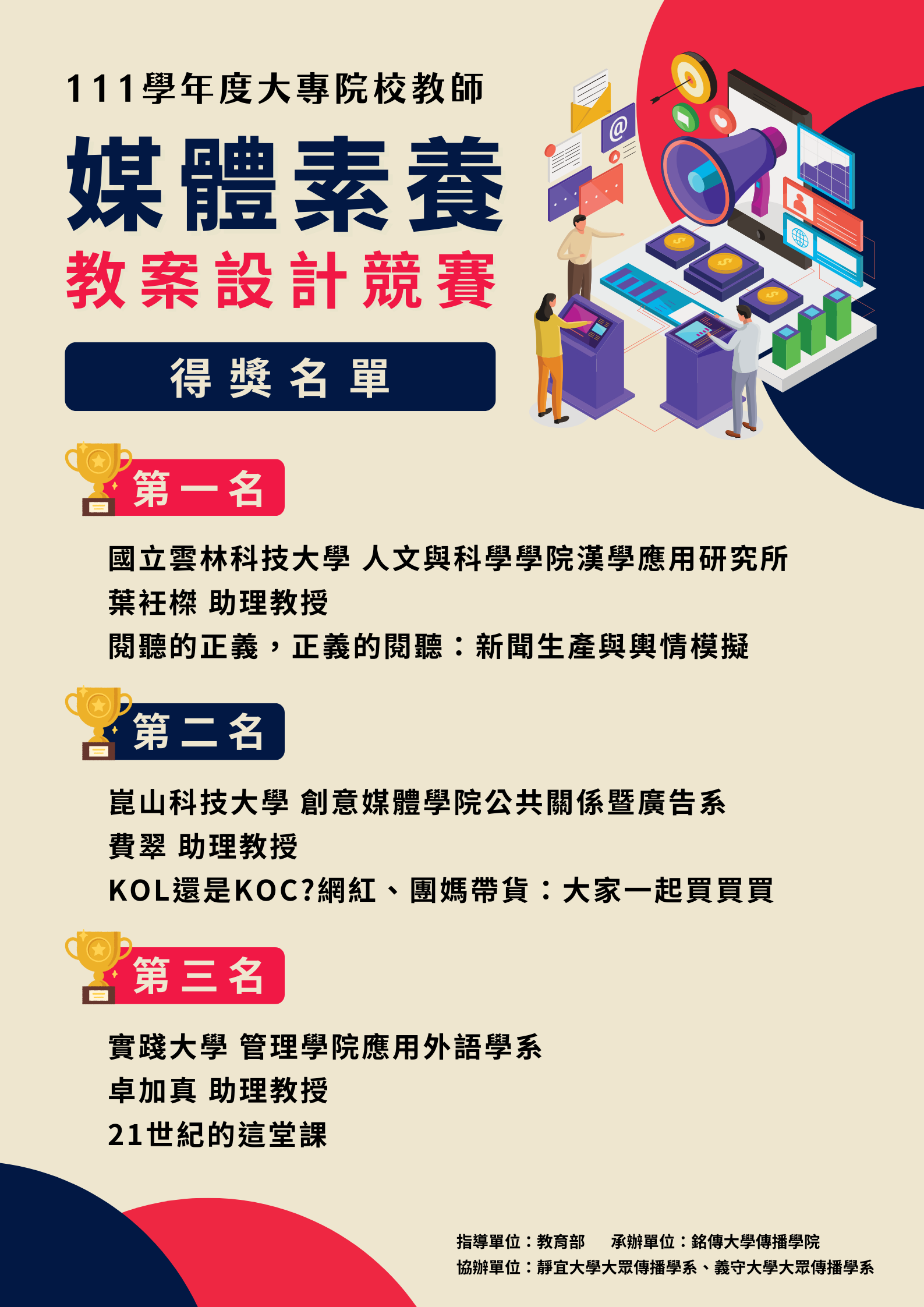The recent rise of new media and social media has gradually changed the type of readers. People no longer only receive information from newspapers, magazines, radio and television in one direction, but enjoy the readily available online information. It also bears the potential risk of information that has never existed before. In order to cultivate students' positive use of media and media literacy skills, the Ministry of Education has promoted the "Higher Education Media Literacy Curriculum Development Plan" since the 2019 academic year. In order to encourage teachers in various schools to develop media literacy course modules and teaching materials, Ming Chuan University, Jingyi University and I-Shou University hold the media literacy teaching plan design competition for teachers in the 111 academic year and announce the list of winners.
This competition encourages teachers to compile media literacy textbooks focusing on teaching themes such as "Media Literacy Boundary", "Media Types and Literacy", "Critical Thinking Issues in the Age of Media Convergence", and develop students' exploration and autonomy through issues closely related to daily life. Learning teaching strategies, developing courses on media literacy education issues, teaching students media literacy skills such as "seeking and obtaining information", "evaluating and interpreting information" and "creating and sharing". The judging focus of this competition includes three aspects: content continuity, teaching applicability, and teaching innovation. It is expected that teachers will use life-oriented teaching materials to allow students to practice media literacy in their lives, and at the same time improve teachers' media literacy course design, teaching material compilation and Ability to implement teaching.
The winner of this competition was "The Justice of Reading and Listening, Just Reading and Listening: News Production and Public Opinion Simulation" written by Assistant Professor Ye Jinli from the Institute of Applied Sinology, School of Humanities and Sciences, National Yunlin University of Science and Technology. The teaching plan is aimed at students from non-journalism and communication departments, incorporating examples of news identification, through the process of actually producing news, to reflect on how to be a reader with technology and media literacy in daily life; the second place is from Kunshan Assistant Professor Fei Cui, Department of Public Relations and Advertising, School of Creative Media, University of Science and Technology was selected to write an article "KOL or KOC? Internet celebrities and group mothers bring goods: everyone buys and buys together" "Buy" to explore how new-form content creators build their own brand images and how advertising brand owners cooperate with them, allowing students to actually design self-media curation proposals, so as to better understand the thinking points behind new business models that may be overlooked; selected The third place "This Lesson in the 21st Century" was written by Zhuo Jiazhen, Assistant Professor of the Department of Applied Foreign Languages, School of Management, Shih Shih University. In one of the college English general education courses, he read "21 Lessons in the 21st Century" "Based on the "Community" chapter in the book, use online software to interact and discuss with students, and lead everyone to think about issues such as social media addiction and values reflected by algorithms. While training English skills and understanding related vocabulary, Allow students to further think about the issues that they should be aware of in the community era.
The Ministry of Education hopes that through this competition, more college teachers will be involved in the design of relevant teaching plans. Through teachers' innovative and lively teaching plans, students will be able to rationally face a large amount of information and possible risks from the outside world, and further strengthen students' critical thinking. , Towards a more rooted and comprehensive media education, to enhance Chinese people's media literacy knowledge and independent thinking ability.
